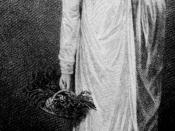In Hamlet, the women act the small roles portraying their historical status at the time. Although Gertrude is the Queen of Denmark and Ophelia is the prince's lovers, they have no standing in the society and their voices are never heard. Their actions and fates are greatly influenced by the men's decisions. All their lives Ophelia and Gertrude are led by the men's power; they together make a weak image of dependent women at Shakespeare's time.
Although Gertrude and Ophelia are not well developed through out the play, their actions, language and influence on the play portray them as the obedient passive type of women. Gertrude is Hamlet's mother, a queen who betrayed her husband and got seduced by the prince's uncle Claudius. She remarried with him and thereafter obeyed every order from Claudius. Gertrude is objectified by Claudius, as he said: "my crown, mine own ambition and my Queen."
To him the queen is one of his possessions and not even listed as the first. This suggested Gertrude is used by Claudius to get to the throne. The hasty marriage only a few weeks after her husband's death shows her great dependence on men. Hamlet's proclamation that he will "speak daggers to her, but use none" illustrate that he perceives her to be inferior, weak enough to fall foul to his words. Overall, Gertrude is the type of women that cannot survive without a man in her life, with such a weak soul she betrays her own husband and son.
Ophelia is different from Gertrude. She is innocent, and naïve with no experience in life. She does love Hamlet with her pure heart, but she is also too submissive to her dad Polonius and brother Laertes. As they claim Hamlet is dangerous, that Hamlet's "will is not his...


